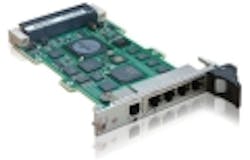FAA clears ITT-deployed ADS-B system cleared for nationwide rollout
WHITE PLAINS, N.Y., 30 Nov. 2010. ITT Corp. in White Plains, N.Y., received clearance from the U.S. Federal Aviation Administration (FAA) for nationwide deployment of the satellite-based air traffic surveillance system, Automatic Dependent Surveillance -- Broadcast (ADS-B). ITT provides radios, routers, and radio control stations for the program. This means that air traffic controllers can now more accurately separate aircraft in the U.S. with ADS-B coverage by displaying aircraft tracked through the new ADS-B global positioning technology, as well as displaying traditional radar monitoring.
Benefits include more accurate information and more rapid updates than current systems, says John Kefaliotis, ITT’s vice president of next generation transportation systems. “We will be able to deploy surveillance where never before such as on oil platforms,” he says.
Since 2007, ITT has been under contract to the FAA to deploy the ADS-B ground infrastructure in support of the FAA's overall Next Generation Air Transportation System (NextGen) initiative to modernize the U.S. National Airspace System. For more on ADS-B, see related story ADS-B In brings air traffic management to pilots in the cockpit.
Commissioning the system follows ADS-B implementation by ITT at four sites in Alaska, the Gulf of Mexico, Louisville, Ky., and Philadelphia. The “ADS-B technology we provided for these four sites is for critical services also known as surveillance services, Kefaliotis says. Critical means critical to air traffic control, he adds.
The next step involves essential services, which cover Traffic Information Services-Broadcast (TIS-B) and Flight Information Services-Broadcast (FIS-B). TIS-B provides air traffic situational awareness from ground sources such as radar and FIS-B provides information such as weather reports.
For this program test sites was determined due to the variety of operational environments and challenges, Kefaliotis says. Technology was then deployed to that test site, and then it was evaluated and approved for nationwide deployment, Kefaliotis says.
The ADS-B radios
“We’ve got 300 radio stations completed and will have 800 by 2013” when the program is complete, he adds. The radios provided by ITT are not commercial-off-the-shelf (COTS), Kefaliotis says. They were designed with stringent FAA requirements for receiving airborne data reports, he adds. ADS-B radios are less expensive than radar radios.
The radios operate on a frequency of 1090 MHz, which was allocated for this radio, he continues. ITT’s radio architecture enables the radios to distribute information to any ATC facility, he says. ITT has three major radio control systems set up nationwide to enable the network -- Ashburn, Va., Dallas, and Redwood City, Calif.
The radio control stations provide central processing and data distribution services, he says. Some installations will have backup radar control but some will not, he notes. For those aircraft not equipped with ADS-B the ATC facilities can merge ADS-B data with radar data creating a TIS-B capability, Kefaliotis says. for those not equipped with ADS-B, he continues.
ITT's ADS-B team includes: AT&T, which provides the network; Thales, which provides the radios and multi-sensor tracker; WSI, who is the weather service provider; Sunhillo, which provides the service delivery point (SDP) equipment; Pragmatics, which provides software development support; and SAIC, which provides engineering and implementation support.
